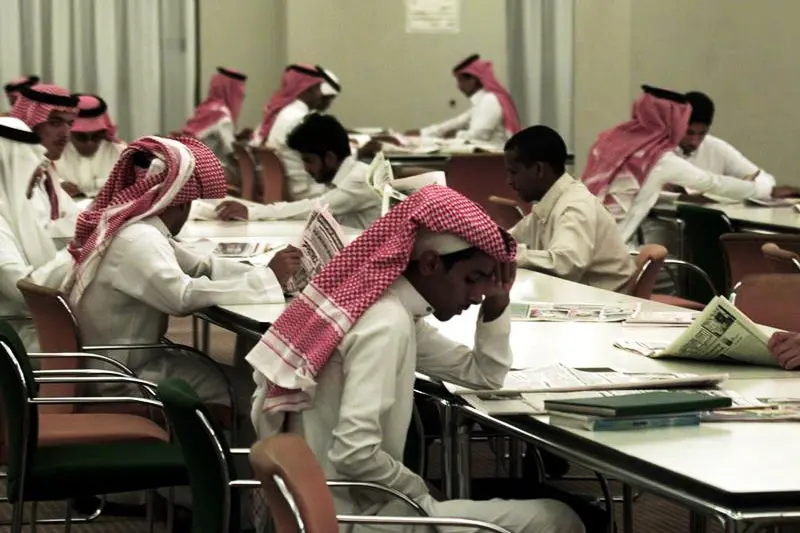PHOTO
06 March 2017
Wrong specializations, fat salaries among impediments to employment RIYADH — About 30 percent of Saudi students who join university fail to complete undergraduate studies and obtain degrees, according to a report of the Human Resources Development Fund carried by the local daily Al-Madina on Sunday.
The report will be discussed by the Shoura Council on Tuesday. It quoted figures released by the Ministry of Education for the year 2016, which put the number of students at 211,890, saying 63,576 of them did not complete their studies.
“Only about 4 percent of the students are specialized in the fields of vocational and technical courses, which are mostly in demand in the labor market,” the report said.
According to the report, about 70 percent of Saudis work in the public sector despite the fact that Saudi citizens in general prefer government jobs.
Speaking about the difficulties before the employment of Saudi nationals, the report said about 55 percent of women and 33 percent of men students prefer specializations that have low demand in the private sector.
The report said about 80 percent of the women who are in the working age are not economically active.
It said the fund has provided jobs to more than 236,000 Saudi men and women through its training programs, which are linked to employment, feminization of work in the lingerie and fashion stores, various Nitaqat employment channels and financial support to Saudi men and women teachers.
“The private sector has provided as many as 306,500 job opportunities, including 100,000 in the commercial sector (33 percent) and 65,577 (21 percent) in the contracting sector,” it said.
The fund said the major difficulties it faced include Saudi job seekers’ preference for government jobs over the private ones and specializations that are no longer required by the labor market.
“A number of educational institutions have refused to amend their syllabuses to cope with the requirements of the labor market,” the report said.
It said the disparity in development and low employment opportunities in various regions of the Kingdom, especially the border areas, have adversely affected the chances of employment for many Saudis in the private sector.
It also said the low cost of hiring expatriates in jobs that could be filled by Saudis who usually ask for fat salaries have also negatively affected the employment of nationals.
The report said women do not have ample employment opportunities in their places of abode and that they are further affected by the lack of proper transportation and a conducive atmosphere for them in work places.
“A number of private sector establishments were not willing to provide an atmosphere appropriate for women’s work,” it said.
© The Saudi Gazette 2017
Wrong specializations, fat salaries among impediments to employment RIYADH — About 30 percent of Saudi students who join university fail to complete undergraduate studies and obtain degrees, according to a report of the Human Resources Development Fund carried by the local daily Al-Madina on Sunday.
The report will be discussed by the Shoura Council on Tuesday. It quoted figures released by the Ministry of Education for the year 2016, which put the number of students at 211,890, saying 63,576 of them did not complete their studies.
“Only about 4 percent of the students are specialized in the fields of vocational and technical courses, which are mostly in demand in the labor market,” the report said.
According to the report, about 70 percent of Saudis work in the public sector despite the fact that Saudi citizens in general prefer government jobs.
Speaking about the difficulties before the employment of Saudi nationals, the report said about 55 percent of women and 33 percent of men students prefer specializations that have low demand in the private sector.
The report said about 80 percent of the women who are in the working age are not economically active.
It said the fund has provided jobs to more than 236,000 Saudi men and women through its training programs, which are linked to employment, feminization of work in the lingerie and fashion stores, various Nitaqat employment channels and financial support to Saudi men and women teachers.
“The private sector has provided as many as 306,500 job opportunities, including 100,000 in the commercial sector (33 percent) and 65,577 (21 percent) in the contracting sector,” it said.
The fund said the major difficulties it faced include Saudi job seekers’ preference for government jobs over the private ones and specializations that are no longer required by the labor market.
“A number of educational institutions have refused to amend their syllabuses to cope with the requirements of the labor market,” the report said.
It said the disparity in development and low employment opportunities in various regions of the Kingdom, especially the border areas, have adversely affected the chances of employment for many Saudis in the private sector.
It also said the low cost of hiring expatriates in jobs that could be filled by Saudis who usually ask for fat salaries have also negatively affected the employment of nationals.
The report said women do not have ample employment opportunities in their places of abode and that they are further affected by the lack of proper transportation and a conducive atmosphere for them in work places.
“A number of private sector establishments were not willing to provide an atmosphere appropriate for women’s work,” it said.
© The Saudi Gazette 2017





















